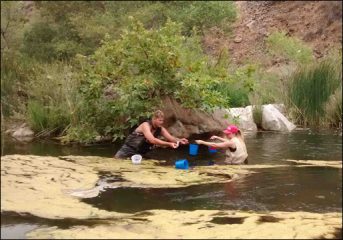Science products endorsed as foundation for crafting statewide stream policy

The Science Advisory Panel, which completed its review in March, found that the suite of six technical reports, journal manuscripts and assessment tools developed by SCCWRP and its partners is either ready for State Water Board staff to use in developing California’s proposed biointegrity-biostimulatory stream policy, or ready for refinement as the State Water Board coalesces around potential policy options.
The panel’s review is the culmination of nearly four years of efforts by researchers to develop the draft science products. The State Water Board commissioned the expert panel in 2017 to incrementally review SCCWRP’s work and eventually evaluate whether the science was robust enough to support development of statewide stream policy. The six-member panel is made up of international experts in stream ecology and biogeochemistry.
State Water Board staff have announced their intent to spend the next 1-1/2 years drafting the biointegrity-biostimulatory policy; it could be released in draft form as early as fall 2020.
The biointegrity-biostimulatory policy is expected to include numeric guidance on how to limit the biostimulatory impacts from eutrophication and other stressors on aquatic life and other beneficial uses. In subsequent phases, the State Water Board plans to create similar technical foundations for developing numeric guidance for lakes, estuaries, enclosed bays and non-wadeable streams.
Other agencies, including California’s Regional Water Quality Control Boards, are exploring how to incorporate the draft products into their stream management programs as well. For example, at an April workshop, the San Diego Regional Board discussed using stream biointegrity scoring tools developed by SCCWRP to measure attainment of biological objectives.
Although the Science Advisory Panel endorsed the science products as a strong foundation for policy development, panelists provided recommendations for refining the analyses and written products to address concerns expressed by stakeholders. SCCWRP has begun working through these recommendations.
The science products developed by SCCWRP and its partners fall into two main categories:
» The biointegrity reports explain how quantitative measures of a wadeable stream’s biological condition relate to the stream’s overall ecological health. These include the Algal Stream Condition Index and a GIS modeling tool that predicts the degree to which stream biointegrity scores are likely to be limited, or “constrained,” by urban and agricultural development.
» The biostimulatory reports identify a suite of eutrophication indicators (e.g., algal biomass, total nitrogen and phosphorus) for quantifying biostimulatory stresses on wadeable streams. They also summarize the scientific basis for setting numeric targets for these eutrophication indicators to guard against biostimulatory impacts. In future revisions, researchers will focus on aligning the biostimulatory-related scientific analyses to policy options under consideration by State Water Board staff.
The Science Advisory Panel’s full recommendations to State Water Board staff have been published in full online. The draft science products, released in October 2018, also are available online.
For more information, contact Dr. Martha Sutula or Dr. Raphael Mazor.
More news related to: Bioassessment, Eutrophication, Harmful Algal Blooms, Indices of Biotic Integrity, Top News